- Home
- Robert Goddard
The Ways of the World Page 26
The Ways of the World Read online
Page 26
‘There’s got to be a reason,’ said Sam. ‘Didn’t Brigham even hint at what it could be?’
‘“If you want to see your uncle again, go there,”’ Nadia replied. ‘That is all he said.’
‘And here we are.’
They reached the bridge and moved into the shadow of the arch. Out of the sun, it was colder by several degrees. Water was dripping from the ironwork above them on to the path and into the canal, where a thin skin of ice had formed along the bank.
Nadia shuddered. ‘There is nothing here,’ she said, her breath clouding before her.
‘There must be.’ Sam looked ahead, then back the way they had come. There was not a soul in sight and not a vessel moving on the canal. It had all the elements of a fool’s errand. But Brigham had surely been in earnest. This was where he had said they should go and this was where they were: the very spot.
‘I thought someone would be waiting for us,’ said Nadia. ‘I even hoped Uncle Igor would be here. But there is no one.’
‘They couldn’t predict when we’d arrive,’ Sam reasoned. ‘Perhaps they’ve watched us approach and will show themselves now we’re here.’
Nadia walked out into the sunlight on the other side of the bridge and gazed around. ‘Where could they be watching from?’
Sam joined her. ‘I don’t know,’ he admitted, surveying the desolate scene. ‘We just have to wait.’
‘For how long?’
‘I don’t know that either.’ A fear he suspected might be far from irrational suddenly gripped Sam. They had been lured to this place for some reason, even if it was not the reason Brigham had given. Someone could be watching them from any number of vantage points. And that someone could be the man who had killed Ennis and wounded Max. ‘Let’s wait under the bridge.’
‘Why? It’s warmer here.’
‘But it’s also more exposed.’ He grasped Nadia by the arm and led her back into the shadow of the arch.
‘You think this is a trap?’ she whispered, her voice quavering with alarm.
‘I’m probably wrong. It’s just—’
Sam broke off. His eye had been caught by a movement at the water’s edge on the other side of the canal. A bubble, lit by a shaft of sunlight, had come to the surface and burst. As he watched, there came another. These bubbles were rising in a patch of ice-free water around a rope tied to a mooring-ring on the towpath. And the rope was taut. There was clearly something heavy on the end of it, beneath the water.
‘What is it?’ asked Nadia. ‘What are you looking at?’
‘I’m not sure. Wait here.’
Sam took off at a sprint. He wanted to reach the other side of the canal before Nadia jumped to the same conclusion he had. If it was the right conclusion, she should be spared it if at all possible.
He ran to the footbridge by the city wall, crossed it and raced back to the bridge. It took him only a few minutes to cover the distance. When he arrived, Nadia stared across at him with an anxious frown.
‘What is it, Sam?’ she called.
‘Probably nothing,’ he called back, bending by the mooring-ring and tugging at the rope. But it was not nothing. A shape stirred in the murky depths of the water. Peering down, Sam made out what looked like a large, bell-shaped sack. He could not simply pull it to the surface. It was too heavy. He heaved at it unavailingly for several seconds, then gave up.
‘I am coming over,’ Nadia called.
‘No. Stay there.’
‘I am coming over.’ And, so saying, she set off.
‘I hope this isn’t what I think it is,’ Sam muttered to himself. Looking along the towpath, he saw an iron ladder fixed to the bank just beyond the bridge. If he could drag the sack as far as that, he would be able to come to grips with it.
He untied the knot round the mooring-ring, took the weight of the sack and looped the rope around his waist so as not to lose his grip, then started walking backwards along the path.
It was slow progress and Nadia had overtaken him by the time he had reached it. She said nothing to him, her face gripped by a dawning realization she clearly could not bring herself to express. Instead, she grasped the rope and pulled along with him.
She lost her footing at one point and fell against him, but assured him through gritted teeth that she was all right. They set to again and eventually reached the ladder, where Sam tied the rope to the top of the stile.
There was nothing to be gained by delay, reluctant as he was to take the next step. It either was what he feared or it was not. Bracing himself against the chill of the water, he climbed down the ladder.
He winced as the freezing water seeped inside his boots and trousers. It was above his knees by the time he was able to reach the sack. He took out his penknife, opened it and stabbed a hole in the material, then sawed upwards to create a slit.
A large bubble of air emerged. As it reached the surface, Sam was enveloped in a foul stench. He coughed and spluttered and, glancing up, saw Nadia cover her mouth and nose. Then he looked down at the sack again and saw something white and swollen flop out through the slit.
It was the head of a man.
‘I’M VERY SORRY for your loss, Miss Bukayeva,’ Appleby said, in a gentler tone than Sam was used to from him.
‘Moi aussi, mademoiselle,’ said Commissioner Zamaron.
They were in Zamaron’s office at the Préfecture de Police, surrounded by his art collection and enveloped in an atmosphere of sombre diligence. Several hours had passed since the discovery of Igor Bukayev’s body in a sack weighed down with rocks, suspended in the Canal de l’Ourcq. The deceased had been taken to a mortuary, where a pathologist was attempting to determine the cause of death.
Nadia had maintained rigid control of her emotions since her initial horror at what she and Sam had found. She spoke quietly and formally and generally avoided eye contact. The only signs of her inner turmoil were the constant clasping and unclasping of her hands.
She and Sam had explained what had led them to the canal without any need of misrepresentation, although Sam had naturally omitted to mention meddling with Brigham’s car. The facts appeared to speak for themselves. Lionel Brigham of the British delegation to the peace conference was implicated in the murder of Igor Bukayev and quite possibly in the murders of Sir Henry Maxted, Raffaele Spataro and Walter Ennis.
The enormity of the allegations against Brigham was clearly a factor in the solicitous but non-committal attitudes of Appleby and Zamaron. Officially, the Paris police still regarded Sir Henry’s death as an accident and Corinne Dombreux was being held by them as a suspect in the murder of Spataro. As for Ennis, they were looking for a killer who had had the audacity to strike from their own headquarters. All in all, Sam reckoned Zamaron was a man with several headaches and no aspirins.
Zamaron had an additional difficulty where Brigham was concerned, as he was at pains to explain to Nadia. ‘All the officials the British have brought here have diplomatic immunity, mademoiselle. I could not even question Monsieur Brigham without the agreement of …’ He turned to Appleby for clarification.
‘The Permanent Under-Secretary,’ Appleby dolefully specified. ‘He’d need a lot of persuading.’
‘And forgive me, mademoiselle, but it would be … comment dirait-on ça? … it would be your account against his for what he said when he visited you last night.’
‘Assuming he admits visiting you at all,’ said Appleby.
Sam said nothing. He had not told Nadia – and he did not want to – that he had been in Little Russia the night before. He would have to tell Appleby, though – as soon as possible.
‘He knows the people who murdered my uncle,’ said Nadia with quiet gravity. ‘You must make him tell you who they are.’
‘We’ll try, miss,’ said Appleby.
‘Can you question him?’
‘I certainly intend to. But I can’t force him to answer my questions.’
‘Unless the Permanent Whatsit says he must?’ suggested Sam. ‘
Is that the size of it, Mr A?’
Appleby glowered at him. ‘How succinctly you put it, Twentyman.’
‘This must be dealt with at the political level, mademoiselle,’ said Zamaron. ‘I will refer the problem to my superiors, who will refer it to their superiors at the Ministère de Justice. There are the Americans to be also considered in the matter of Monsieur Ennis.’
‘Any progress there, Léon?’ Appleby asked in a tone that suggested he assumed there had not been.
‘Non. How the man who shot Ennis entered and left this building is still … without explanation.’
‘You seem to be telling me, gentlemen,’ said Nadia, ‘that there is nothing you can do.’
‘Non, non. We will investigate all the circumstances of your uncle’s death, mademoiselle. We will seek witnesses. We will search for clues. And we will provide you with protection.’
‘I’ll get as much as I can out of Brigham, miss,’ said Appleby. ‘You have my word on that.’
‘If you had seen what Mr Twentyman and I saw … you would not tread so softly.’
‘Unfortunately, we’re obliged to.’
‘And I will be obliged to tell my uncle’s friends that his murderers may be able to hide behind … diplomatic immunity.’
‘Not if I can help it.’
‘But can you help it, Mr Appleby? That is the question.’ With that, Nadia rose to her feet. ‘I must go home now. There is much to be arranged.’
‘I have a car waiting for you, mademoiselle,’ said Zamaron, rising hurriedly himself.
‘Merci, monsieur.’ She turned to Sam. ‘You will tell Max what has happened … when he is better?’
‘Of course.’
‘For all you did, Sam … I am grateful.’
‘Don’t mention it.’
‘This way, mademoiselle,’ said Zamaron, ushering her out.
For a moment, Sam found himself alone with Appleby. ‘Brigham definitely visited Nadia last night, Mr A,’ he said. ‘I saw him park the Daimler and go in.’
‘HX 4344?’
‘The very same.’
‘I’ve confirmed it’s his car. Nadia doesn’t know you were spying on her, I assume?’
‘I wasn’t exactly spying.’
‘But she doesn’t know?’
‘No.’
‘You mightn’t remain the knight in shining armour in her eyes if she found out.’
‘You have to squeeze the truth out of Brigham, sir. He’s in this up to his neck.’
‘And four people are dead.’
‘That’s right. There’s Madame Dombreux as well. She obviously didn’t kill Spataro. You should twist the commissioner’s arm to get her released.’
‘How kind of you to tell me my job, Twentyman.’
‘I didn’t mean to do that.’
‘No? Well, I—’
Appleby broke off as Zamaron rejoined them, wearily rubbing his forehead. ‘Mon Dieu,’ he moaned, ‘what a day!’
Appleby caught his eye. ‘What a week!’
‘You will interrogate Brigham, Horace?’
‘It won’t amount to an interrogation, I’m afraid.’
‘But …’
‘I’ll do my best.’
‘You will need to. The politicians will not want to connect these killings.’
‘I know.’
‘Why not?’ asked Sam.
‘Leave Léon alone, Twentyman. He has enough problems on his plate without being cross-questioned by the likes of you. I’ll tell you as much as you need to know – outside.’
They went down into the courtyard, where Appleby’s car was waiting. He told the driver to take a stroll, while they sat in the back. He obviously wanted no witnesses to what he had to say, which did not strike Sam as promising.
‘Murder’s not uncommon in this city, Twentyman,’ Appleby began, chewing on his unlit pipe. ‘The French are a passionate lot. And the war’s left a good many guns in the wrong hands. Sir Henry’s death really could have been an accident. Madame Dombreux really could have killed Spataro. And the Russians are notorious for score-settling, so Bukayev could be a victim of something in that line. As for Ennis, well, his murder’s hard to explain, I grant you, without imagining a conspiracy to be at work. But Carver will find a way round that, if he’s told to.’
‘And will he be told to?’
‘In all likelihood, yes. To acknowledge the existence of some kind of conspiracy stemming from the presence of past or present German spies within the delegations would be to acknowledge a threat to the validity of the peace conference. It could even lead to its suspension.’
‘Crikey.’
‘Exactly.’
‘I expect our leaders would move heaven and earth to avoid that.’
‘They would. And they will.’
‘What are you going to do, then?’
‘Question Brigham before he has a chance to hide behind the skirts of the Permanent Under-Secretary. If I can persuade him to give himself away …’
‘Max seems to think he’s a wily operator.’
‘No doubt he is. But I have a few wiles of my own.’
‘I’m sure you do, sir.’
Appleby glanced sharply at Sam. ‘Do you mean to be sarcastic, Twentyman, or is it just your natural tone?’
‘You’d have to ask my old mum for a ruling on that, sir.’
‘Since Max trusts you, I have little choice but to do the same, at least while he’s hors de combat. Don’t think that trust is any more than highly provisional, though.’
‘Oh, I wouldn’t dream of it, sir.’
‘If Max doesn’t pull through—’
‘Don’t say that, sir.’
Appleby paused in deference to the sincerity of Sam’s interruption. He sucked on his pipe for a thoughtful moment, then said, ‘I was using Max to do things I’m not free to do for fear of sparking a diplomatic incident. You understand that, don’t you, Twentyman?’
‘I do, sir, yes.’
‘So …’
‘Is there something you want me to do for you?’
Appleby sighed. ‘Much against my better judgement … yes.’
SAM HAD READILY agreed to Appleby’s request, but was not entirely confident of his ability to talk his way into an audience with Baltazar Ribeiro of the Brazilian delegation. He did not lack for nerve, but his appearance and accent often encouraged his social superiors to treat him disdainfully. He would have to tread both boldly and carefully: a tricky combination, to put it mildly.
As it turned out, however, an audience was delivered to him on a plate. When he repaired to the Hôtel Dieu to see whether there had been any improvement in Max’s condition, Burley surprised him with the announcement that Max had a visitor. ‘Brazilian gent by the name of Ribeiro: senior member of their delegation. Not the sort of bloke you turn away.’
Sam went into the room and found a large, smartly dressed man sitting in a bedside chair that was obviously too small for him, gazing anxiously at Max, who was drifting feverishly in and out of sleep and probably unaware that there was anyone with him at all.
Ribeiro’s tanned skin and thick white hair gave him a vigorous appearance, but he was breathing heavily, perhaps because he was upset by the state he had found his old friend’s son in – or perhaps because he felt responsible for it. He was clad in a voluminous green overcoat and was turning a string of rosary beads fretfully in his fingers.
‘Senhor Ribeiro?’ Sam asked.
‘Sim.’ Ribeiro turned a pair of rheumy eyes in Sam’s direction. ‘O que?’
‘My name’s Twentyman. I’m a friend of Max’s.’
‘You are?’
‘I served under him in the war.’
‘Ah. I understand.’ Ribeiro rose and clasped Sam’s hand in both of his, grinding a rosary bead into Sam’s thumb in the process. ‘This is very bad. I am saddened to see him so ill.’
‘How did you hear about it?’
‘Ah …’ Ribeiro hesitated.
‘Max
told me everything, senhor. I know you passed him the message from Ennis.’
‘Poor Ennis. To die like that, here, in the centre of Paris. You served under Max in the war, you say?’
‘Yes. Perhaps … we could go somewhere for a quiet word, sir.’
Sam piloted Ribeiro to a cheerless and sparsely populated canteen in the bowels of the building. Ribeiro revealed en route that he had heard of Ennis’s demise on the conference grapevine. The murder of a delegate had a lot of people worried. ‘And they will remain worried, until the authorities can assure them the crime had nothing to do with the business of the conference.’
Naturally, Ribeiro had been rather more than worried, since he it was who had told Max that Ennis would be waiting for him at Notre-Dame. Learning a so-called bystander had been wounded, he had feared the worst. And he had been right to.
‘I blame myself for passing the message,’ he said glumly as they reached the canteen. ‘I should have refused.’
‘Max was glad to get the chance to meet Ennis, senhor,’ Sam consoled him. ‘It wasn’t your fault.’
Ribeiro appeared unconvinced and the coffee the canteen supplied seemed to do nothing to lift his spirits.
‘I wanted to ask you exactly what Ennis said when he called round at your hotel yesterday morning, senhor,’ Sam ventured.
‘It was as I told Max. It was not a long conversation. Ennis was frightened, though he would not say what he was frightened of. He only wanted to be sure I would contact Max and—’
‘You asked him what he was frightened of?’
‘Yes. He only shook his head.’
‘Nothing else?’
Ribeiro raised his coffee-cup, but put it down again without drinking. He frowned thoughtfully. ‘“What is wrong, Walter?” I asked. Yes. That is what I said. “What is wrong?” And he shook his head. And I asked again. And he gave me such a tired look. He was weary to his core. “Contingencies, Baltazar,” he said. “It’s the ones you can’t foresee that get you in the end.”’
‘Contingencies?’
‘Yes. Contingencies.’
‘But what did he mean?’
‘I do not know. He would say no more than that. I asked if I could help him. He shook his head again and walked away.’

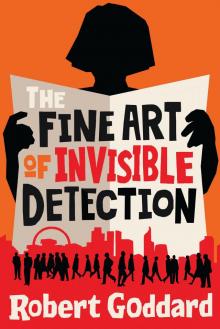 The Fine Art of Invisible Detection
The Fine Art of Invisible Detection One False Move
One False Move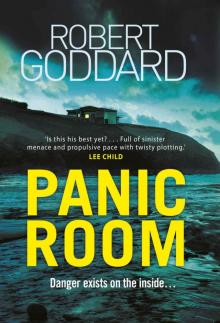 Panic Room
Panic Room Beyond Recall
Beyond Recall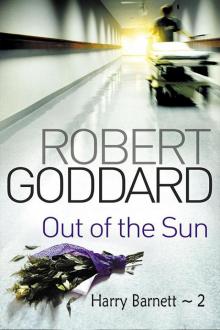 Out of the Sun
Out of the Sun In Pale Battalions - Retail
In Pale Battalions - Retail Painting The Darkness - Retail
Painting The Darkness - Retail The Corners of the Globe
The Corners of the Globe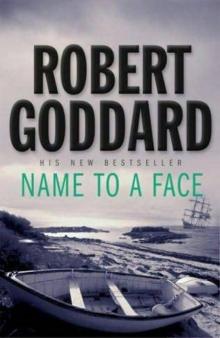 Name To a Face
Name To a Face Closed Circle
Closed Circle Caught In the Light
Caught In the Light Into the Blue
Into the Blue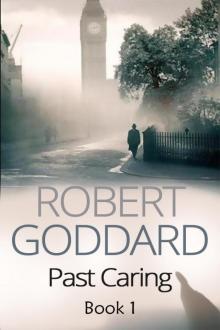 Past Caring - Retail
Past Caring - Retail Past Caring
Past Caring Hand In Glove - Retail
Hand In Glove - Retail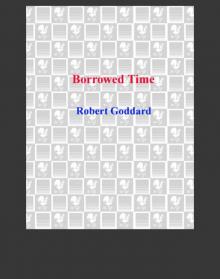 Borrowed Time
Borrowed Time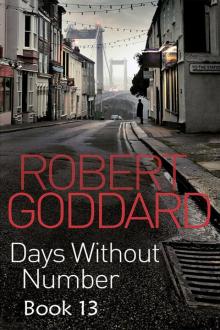 Days Without Number
Days Without Number James Maxted 03 The Ends of the Earth
James Maxted 03 The Ends of the Earth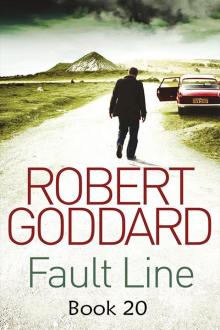 Fault Line - Retail
Fault Line - Retail Play to the End
Play to the End Sea Change
Sea Change Never Go Back
Never Go Back Take No Farewell - Retail
Take No Farewell - Retail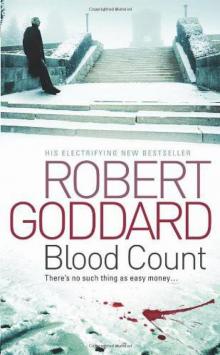 Blood Count
Blood Count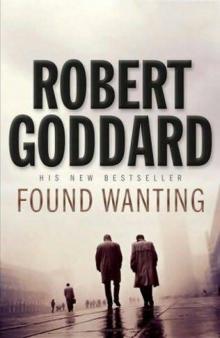 Found Wanting
Found Wanting Sight Unseen
Sight Unseen Hand in Glove
Hand in Glove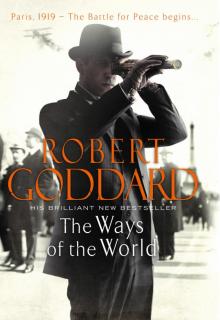 The Ways of the World
The Ways of the World